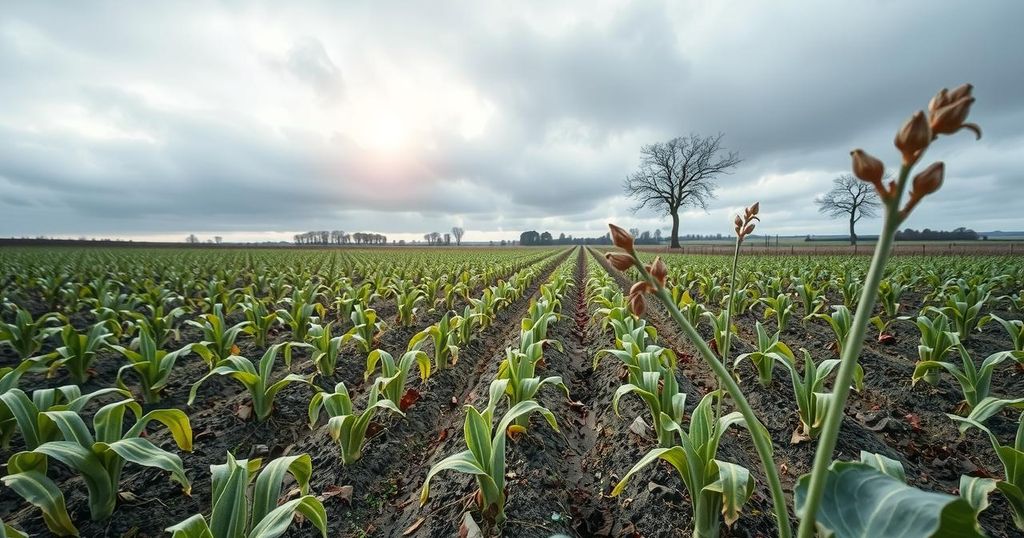Climate change in Rajshahi poses significant risks to winter crop farming, particularly affecting vegetables. Increased duration and intensity of winter, alongside adverse weather patterns, necessitate immediate agricultural adaptations. Farmers urge international compliance with climate funding agreements while advocating for their rights. Experts emphasize the need for urgent intervention to secure food stability amid these challenges.
Climate change is increasingly threatening winter crop farming in Rajshahi, especially vegetables. Changes in winter duration and intensity over recent years have adversely affected farming conditions and produced a cascade of natural disasters. To address these challenges, immediate measures are necessary to enhance agricultural productivity while ensuring food security in light of ongoing climatic disruptions.
Abdur Rahim, a farmer from Bargachhi village, highlighted how climate change is drastically impacting winter vegetable production and biodiversity, thereby jeopardizing food supplies. He advocates for developed nations to uphold their climate funding commitments and maintain transparency regarding this financial aid. Furthermore, he emphasized the need to protect the legitimate rights of farmers to bolster agricultural yields in response to rising demand.
Shahidul Islam, a regional coordinator with the Bangladesh Resource Centre for Indigenous Knowledge, noted that the current agricultural framework is increasingly vulnerable to the effects of climate change, which contributes to numerous natural calamities. He underscored the alarming impact of climate change on regional water resources, particularly in Barind.
Research by Professor Chowdhury Sarwar Jahan from Rajshahi University indicates that maximum temperatures favorably influence the yields of Aus, Aman, and potatoes but harm Boro and wheat outputs. Conversely, minimum temperatures negatively impact most crops except Aman and Boro, with rainfall having a limited effect on yield increases. The region is particularly susceptible concerning food security and water availability.
In an interview, Prof. Osman Gani Talukder, Vice-Chancellor of Varendra University, stressed the necessity of implementing measures to mitigate climate change effects in the area, which threaten both livelihoods and living conditions. He described the significant impact of climate change across various agricultural sectors, particularly regarding food production, livestock, and fisheries.
Prof. Laila Arzuman Banu from Rajshahi University outlined common drought-induced issues such as dust storms, decreasing crop growth due to inadequate irrigation, malnutrition, and habitat destruction. She revealed that over 16,000 deep tube wells are currently relied upon for groundwater extraction, vital for maintaining irrigation-dependent paddy production to support the growing population.
The impacts of climate change are a growing concern for agricultural sustainability in Rajshahi, Bangladesh. This region faces particular challenges in winter crop production due to unprecedented weather changes and recurrent natural disasters. As a key agricultural area, addressing these environmental shifts is crucial for securing food supplies and protecting farming communities. Understanding the local agricultural dynamics and the related implications of climate variability is essential for exploring viable solutions.
The threats to winter crop farming in Rajshahi underscore the urgent need for adaptive measures to safeguard agricultural productivity amid climate change. Farmer rights must be respected, and international commitments to climate financing should be fulfilled. Collaborative efforts to improve agricultural practices and protect vital water resources are pivotal in addressing these pressing challenges to ensure regional food security for the future.
Original Source: www.bssnews.net






